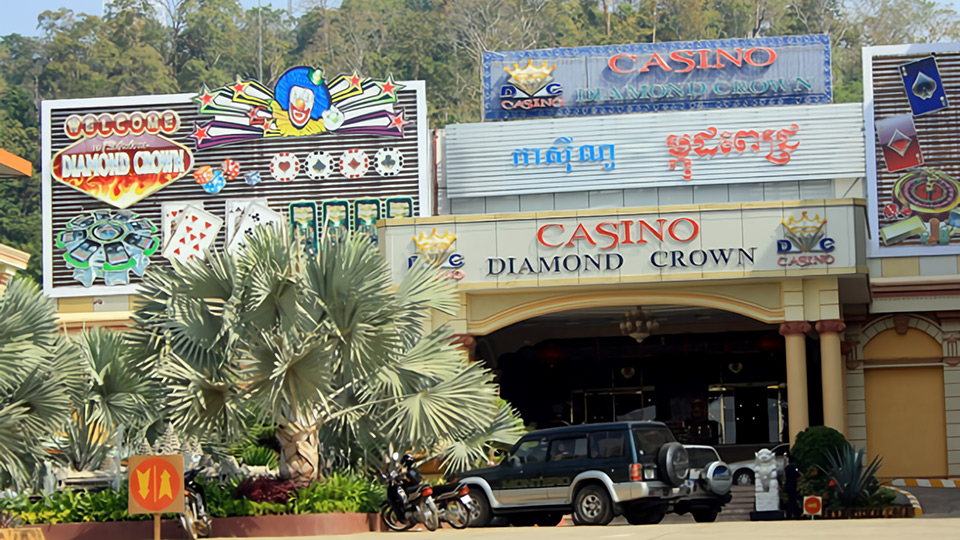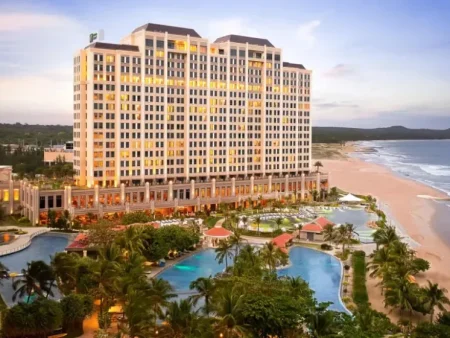In a decisive move to curb cross-border crime, Thailand has announced plans to construct a 55-kilometer wall along its border with Cambodia, specifically in the Sa Kaeo-Poipet region. The proposed wall aims to address a growing crisis involving illegal gambling, human trafficking, and scam operations that exploit the porous border between the two countries. Thai officials view the wall as a critical tool to prevent illegal crossings, which have long enabled underground activities—especially gambling and online fraud—to flourish in the border town of Poipet.
Poipet, located just across the border from Thailand, has earned a reputation as a mini gambling hub. Although gambling is illegal in Thailand, the casinos of Poipet attract thousands of Thai nationals each year seeking to circumvent local laws. The region’s gambling economy has also provided fertile ground for illegal operations to take root. In recent years, Poipet has become notorious not just for its casinos, but also for its involvement in cybercrime and fraudulent call centers. These operations often exploit vulnerable workers, many of whom are lured with false promises of legitimate jobs but end up trapped in scam compounds.
Recent Crackdowns and Incidents
Apacaff | Recent crackdowns have shed light on just how widespread and dangerous these operations have become. In one high-profile raid conducted by Cambodian police—supported by intelligence from China and Thailand—over 215 people were rescued from a scam center in Poipet. Among them were Thai and Chinese nationals, many of whom were trafficked across the border and held against their will.
Victims shared harrowing stories of being forced to work long hours, sometimes under the threat of violence, scamming victims online through fake websites or posing as law enforcement or bank officials. The illegal businesses generated millions of dollars in fraudulent transactions, and were often protected through corruption, false documentation, and loopholes in cross-border jurisdiction. These revelations have sparked international outrage. China, whose citizens have often been targeted or involved in these networks, has pushed for stronger regional enforcement. Cambodia has responded with more raids, while Thailand has begun reassessing its border security strategy—leading to the proposed construction of the wall.
Thailand’s Response: The Border Wall Proposal
The 55-kilometer barrier is set to be built along key points of the Sa Kaeo province, which borders Cambodia’s Banteay Meanchey province where Poipet is located. Thai authorities envision the wall not just as a physical barrier, but as a strategic deterrent against illegal immigration, trafficking, and organized crime.
According to officials, the wall will be accompanied by increased surveillance, including security cameras, motion sensors, and regular patrols by border police and military units. The goal is to prevent unauthorized crossings, limit the movement of traffickers, and give law enforcement better control over entry and exit points.
Critics of the plan argue that a wall alone won’t solve the problem, pointing out that corruption, insider connections, and loopholes in international cooperation often allow these syndicates to adapt and relocate. However, supporters believe that any additional layer of protection is worth the investment, especially given the scale of exploitation currently taking place.
Regional Implications and Cooperation

The issues stemming from Poipet are not confined to Thailand and Cambodia. Similar scam compounds and illegal casino operations have been reported in Myanmar, Laos, and the Philippines, making this a regional crisis rather than an isolated event. What’s troubling is the international nature of these criminal operations. Syndicates often span across multiple countries, recruiting workers from one nation, operating in another, and targeting victims globally through digital channels. Combatting these networks requires not only strong borders but also multilateral collaboration, intelligence sharing, and legal reforms.
Thailand’s border wall may provide a short-term solution, but the long-term success will depend on sustained cooperation with Cambodia and regional partners, pressure on corrupt officials, and the protection of victims—especially those trafficked unknowingly into scam jobs. Thailand’s proposed border wall with Cambodia is more than just a wall—it’s a symbol of rising concern over the unchecked growth of cross-border criminal enterprises. As Poipet becomes the focal point of Southeast Asia’s illegal gambling and scam epidemic, decisive action is needed to stem the tide of exploitation and financial crime.
While no single measure can guarantee complete security, this wall marks a shift in Thailand’s strategy: from reactive enforcement to proactive prevention. As the wall goes up, the world will be watching to see if it brings real change—or simply pushes the problem deeper underground.












